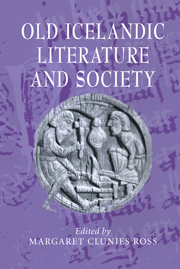Book contents
- Frontmatter
- Contents
- List of contributors
- Introduction
- 1 Social institutions and belief systems of medieval Iceland (c. 870–1400) and their relations to literary production
- 2 From orality to literacy in medieval Iceland
- 3 Poetry and its changing importance in medieval Icelandic culture
- 4 Óláfr Þórðarson hvítaskád and oral poetry in the west of Iceland c 1250: the evidence of references to poetry in The Third Grammatical Treatise
- 5 The conservation and reinterpretation of myth in medieval Icelandic writings
- 6 Medieval Icelandic artes poeticae
- 7 A useful past: historical writing in medieval Iceland
- 8 Sagas of Icelanders (Ílendinga sögur) and þœttir as the literary representation of a new social space
- 9 The contemporary sagas and their social context
- 10 The Matter of the North: fiction and uncertain identities in thirteenth-century Iceland
- 11 Romance in Iceland
- 12 The Bible and biblical interpretation in medieval Iceland
- 13 Sagas of saints
- Index
- CAMBRIDGE STUDIES IN MEDIEVAL LITERATURE
3 - Poetry and its changing importance in medieval Icelandic culture
Published online by Cambridge University Press: 15 October 2009
- Frontmatter
- Contents
- List of contributors
- Introduction
- 1 Social institutions and belief systems of medieval Iceland (c. 870–1400) and their relations to literary production
- 2 From orality to literacy in medieval Iceland
- 3 Poetry and its changing importance in medieval Icelandic culture
- 4 Óláfr Þórðarson hvítaskád and oral poetry in the west of Iceland c 1250: the evidence of references to poetry in The Third Grammatical Treatise
- 5 The conservation and reinterpretation of myth in medieval Icelandic writings
- 6 Medieval Icelandic artes poeticae
- 7 A useful past: historical writing in medieval Iceland
- 8 Sagas of Icelanders (Ílendinga sögur) and þœttir as the literary representation of a new social space
- 9 The contemporary sagas and their social context
- 10 The Matter of the North: fiction and uncertain identities in thirteenth-century Iceland
- 11 Romance in Iceland
- 12 The Bible and biblical interpretation in medieval Iceland
- 13 Sagas of saints
- Index
- CAMBRIDGE STUDIES IN MEDIEVAL LITERATURE
Summary
The purpose of this chapter is to examine the function of poetry in Icelandic culture from the tenth to the end of the thirteenth century. It will show not only how the societal changes that took place during this period had a profound impact on the different genres of Old Norse poetry, but also how the image of poetry and the social status of poets projected in the narratives passed down in oral tradition and recorded in the thirteenth century in turn came to play a crucial role in shaping the cultural and political developments of late medieval Iceland. The first part of the chapter outlines the formal and functional features that characterize eddic and skaldic poetry. The second part discusses the transmission of these two types of poetry, with special attention to the narrative prosimetrum of the thirteenth-century kings' sagas, sagas of Icelanders and contemporary sagas. Part three is devoted to the skaldic panegyric and its subgenres. It illustrates how the conversion to Christianity affected a poetic tradition steeped in pagan imagery; how new poetic genres emerged in the service of the Christian faith; and how certain types of poetry ceased to be productive while others adapted themselves to the new cultural climate and continued to be extremely important in maintaining Icelandic national identity and setting the members of the Icelandic free state apart from their Scandinavian neighbours.
- Type
- Chapter
- Information
- Old Icelandic Literature and Society , pp. 61 - 95Publisher: Cambridge University PressPrint publication year: 2000
- 5
- Cited by

